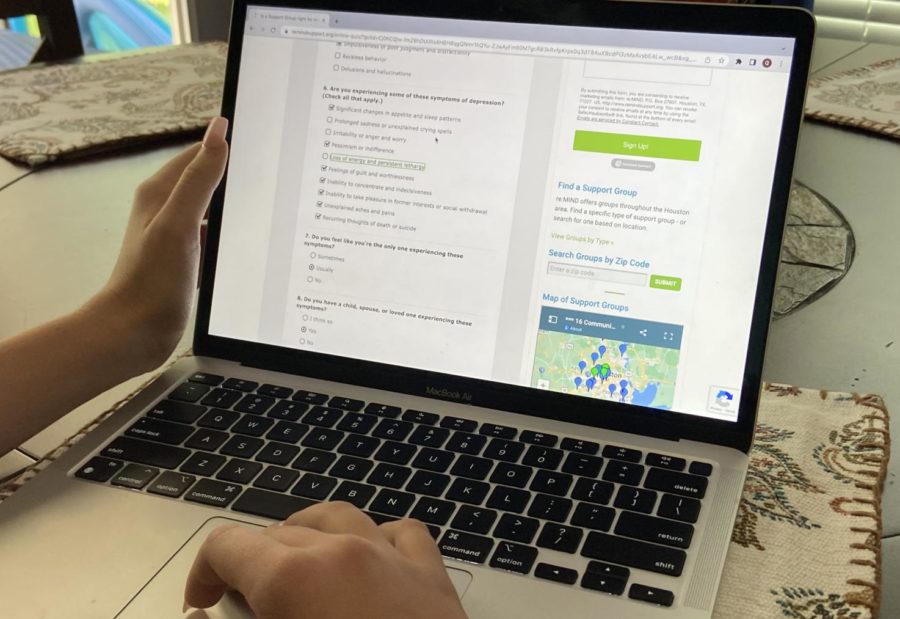The danger of self-diagnosis
Self-diagnosing rather than talking to a professional may seem easier, but there are real dangers
photo by Angelica Mendez
While turning to the internet to diagnose symptoms you may be feeling seems like the fastest and easiest solution, it does pose some problems. Misdiagnosis and incorrect treatment are only a few of these possible issues.
Sarah* knew the problem had gone too far when her parents had to call the doctor because she was drunk multiple times. Her drug and alcohol use—or, as she called it, depression treatment— was not working. She knew she needed to find a way to better treat the challenges she was facing that would not lead to further problems.
When Sarah first started noticing how restless and alone she felt, she turned to the internet to figure out what was happening. Sarah diagnosed herself with depression. But she was only half-right.
Sarah realized that the ways she was trying to treat herself were not working. In fact, they ended up giving her bad anxiety, making her feel worse and even resulted in her having to confess to her parents about using drugs to cope.
“When trying to self-treat my depression, I ended up doing things that made my anxiety worse without realizing it,” Sarah said. “One thing I tried was socially expanding myself in hopes to feel better but my anxiety did not agree with the socialization I was forcing myself to do.”
Self-diagnosis is when you diagnose yourself with a medical or psychological condition based on symptoms you think you have without actually talking to a trained specialist about it.
As a result of feeling worse, Sarah decided to talk to a medical professional in hopes of finding out what was really wrong and finding treatments that could actually help her. She was then clinically diagnosed with anxiety and depression. After her diagnosis, she was given proper medicine and proper help.
“Getting help did a lot more than me constantly trying to figure out ways to help myself—it allowed me to receive real medicine for treatment and methods to cope that worked for both my anxiety and depression,” Sarah said. “It also allowed me to be more open about the things I had going on in my life.”
However, Sarah is not alone when it comes to self-diagnosis. According to a research study published by the National Library of Medicine in 2020, when Americans discover symptoms for a potential health problem, about 70% of them turned to the internet to find medical solutions instead of seeking actual help.
“Sometimes people want to diagnose themselves, because they feel like it might be easier for them to digest than actually finding out what’s going on,” mental health counselor James Bartlett said. “But self-diagnosing is a very slippery slope. I think at the end of the day, a lot of people end up diagnosing themselves with something way worse than reality.”
By solely relying on the internet for medical answers, not only is there the possibility for misdiagnosis, but people do not get the actual help and treatment they may need to solve their issues. This can make people turn to false treatment and medication, along with taking the wrong steps to get better. In the worst case scenario, one could try turning to different unprescribed medicine or techniques to try to feel better, techniques that will only make them feel worse in the end and that can even be fatally dangerous.
When Amanda* realized she got worked up and nervous about the smallest of things, she put all her symptoms together to try to diagnose herself. She thought she might have the symptoms for anxiety and as a result, she tried to seclude herself from other people in order to deal with it. But in the end, it did not help her feel better or solve the problem.
“I would not talk to anyone, which made it worse because I was still thinking about it a lot and I was thinking about it more when I was by myself,” Amanda said. “That was all I was focused on, because there was no one there to distract me.”
After talking to a specialist, Amanda had diagnosed herself correctly; however, this time she was able to get actual treatment that would help. She was prescribed anti-anxiety medicine which she now takes before things she knows makes her anxious, such as sports and exams. Since starting to take the medicine, Amanda has noticed it actually helps her anxiety compared to when she tried her own methods to feel better.
For Amanda, diagnosing herself led her to the right conclusion; it was just a matter of getting the right treatment. And yes, self-diagnosing can be a step in the right direction when it comes to having an idea of what someone could have, but it is still important to get an exact answer and treatment from a professional, according to AP Psychology teacher Heather Douglas.
“It is good to be reflective, introspective and evaluate your life and what role you play in it, but we are not qualified to ‘diagnose ourselves,'” Douglas said. “Just like any other thing, if you knew you were struggling [physically] you would seek medical treatment and I think you should do the same for your mental health.”
However, there are some people who do not feel like they have to reach out for help after diagnosing themselves. After Lauren* realized she had a very short temper, little patience and multiple mood swings, she scoured the internet to find out what could be wrong, eventually coming to the conclusion that she could be bipolar.
Unlike Sarah and Amanda, Lauren has not spoken to a professional and does not feel like she needs to. Instead, she focuses on treating it in ways that she feels helps.
“I have been going to the gym and doing yoga to stop the mood swings,” Lauren said. “I have tried journaling in the past but I found that it did not work for me personally. I noticed that when I am active I am a lot calmer and the mood changes are less frequent.”
Lauren believes that if you find ways to cope that help you, then you should not have to actually get diagnosed unless it is severe and nothing is helping. Because she has found ways that have helped her thus far, she does not plan on talking to a specialist unless they stop working.
For some people who do wish to seek help, it can be hard. Between reaching out for help, having others know that something could be wrong and having to accept whatever your diagnosis is, it can be scary to turn to a professional rather than the internet.
“You may not want to know what the answer is, so there is reluctance to see what [your diagnosis] is, and then there is the social stigma attached to it.” Douglas said. “If I told you I had cancer, you would feel bad for me; if I told you I had schizophrenia you would be afraid of me. Neither of them are the individual’s fault.”
According to Bartlett, although it can be hard reaching out to a specialist because of having to tell someone what is going on, there are things you can do to try to make it easier. He suggests writing down or logging possible symptoms one feels and bringing it to a professional or even a school counselor when they are ready.
“Although talking to someone seems scary, the result of it is much more significant than letting your feelings constantly dwell,” Sarah said. “The only thing I would change about getting help would be getting it sooner.”
Sarah,* Amanda* and Lauren* wish to remain anonymous
Your donation will support the student journalists of Hagerty High School. Your contribution helps us publish six issues of the BluePrint and cover our annual website hosting costs. Thank you so much!







